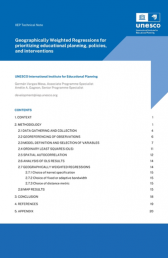
About the publication
The position of skills development on the agenda of policy-makers and development agencies improved markedly around the turn of the 21st century. This book tracks the ways skills have gained importance both in the developing and the more industrialized world. It analyses critically the multiple 'drivers' of skills development and the linkages of skills to the knowledge economy, growth, and employment in an increasingly competitive world. It also acknowledges the many modalities and delivery systems for skills development, arguing that this institutional diversity, often spread across several ministries and training authorities, has made it more difficult to give a national account of the skills development sector. The re-emergence of skills has triggered many reform initiatives associated with TVSD, some of which have become almost 'fashions' and are in danger of being adopted without sufficient evidence of their effectiveness. This work provides cautionary advice and fresh insights that planners will find rewarding.









